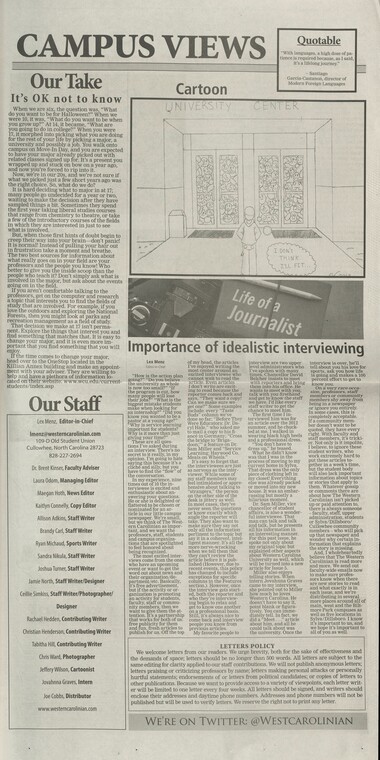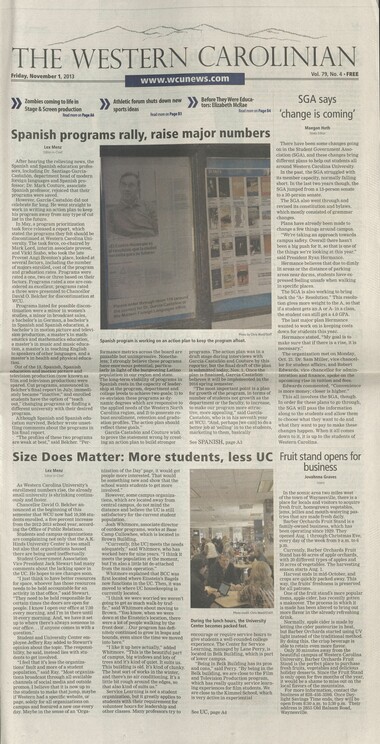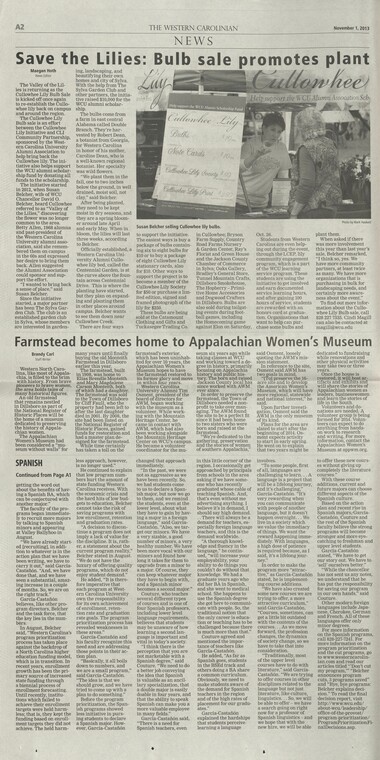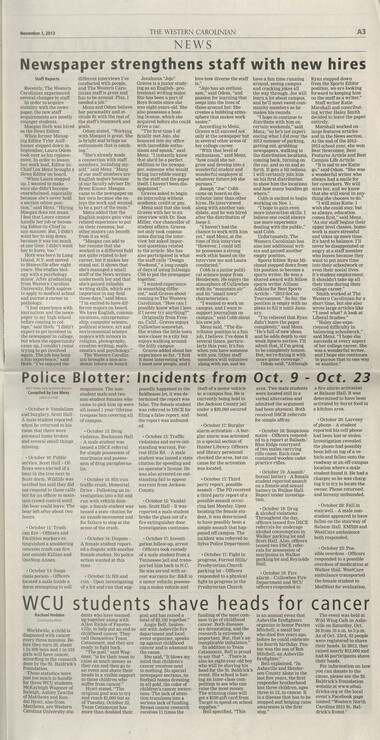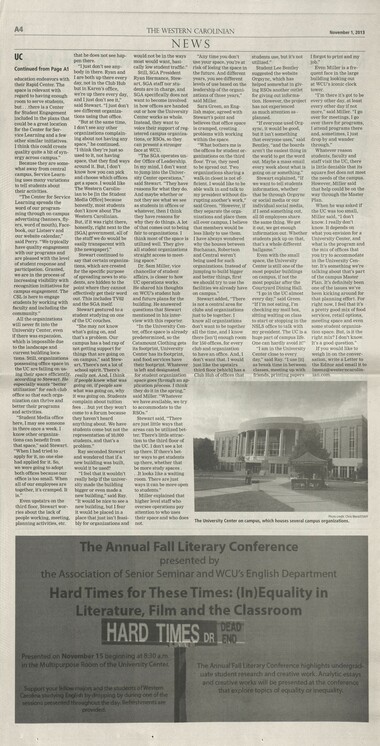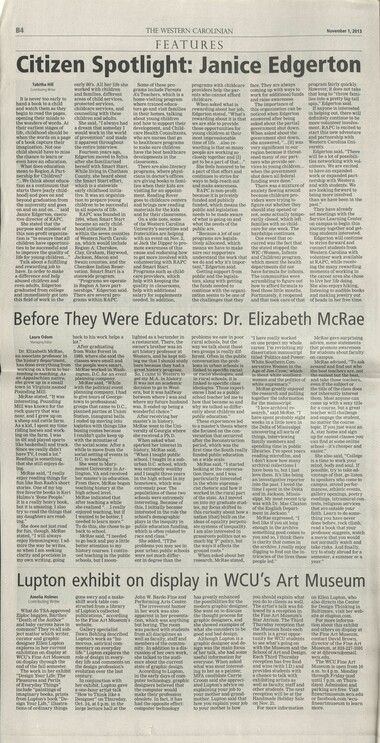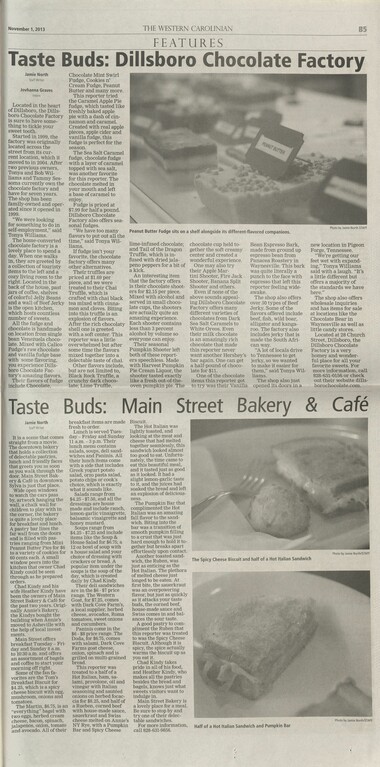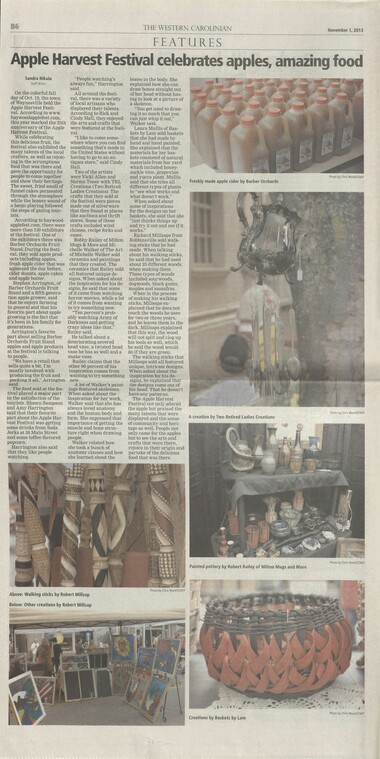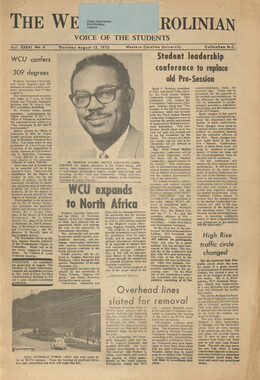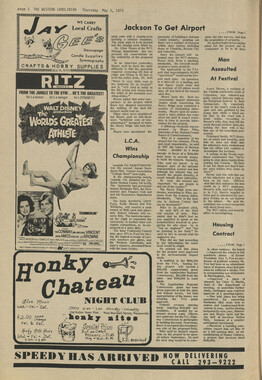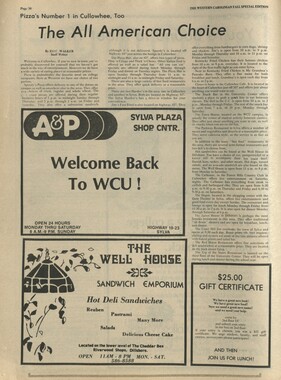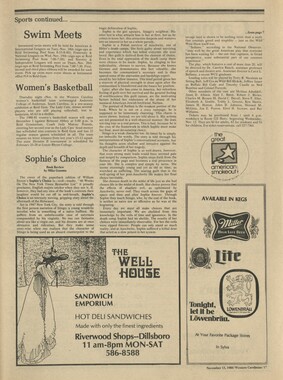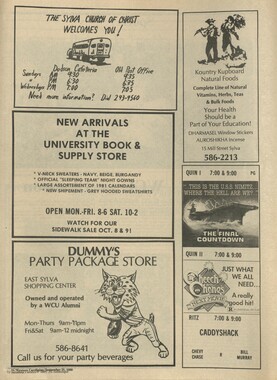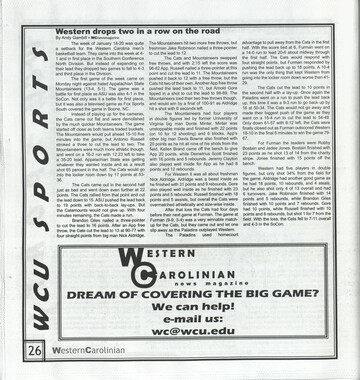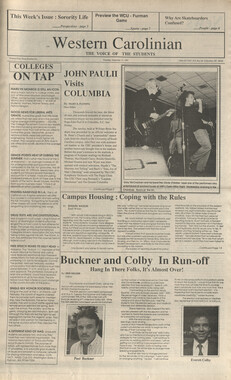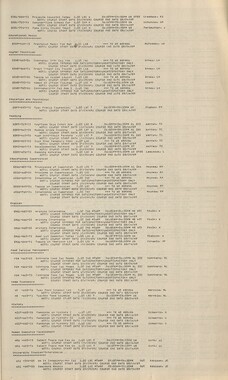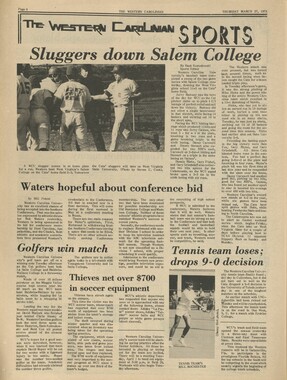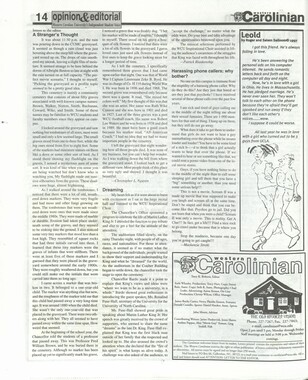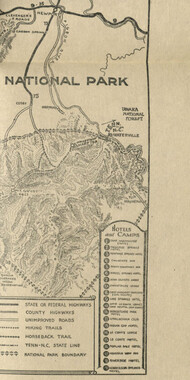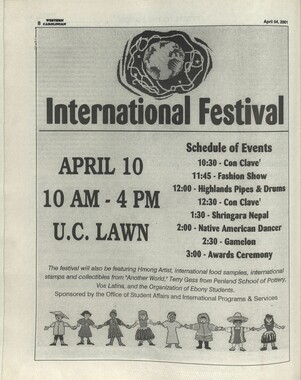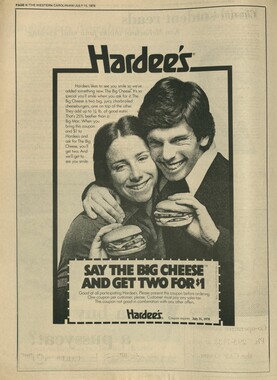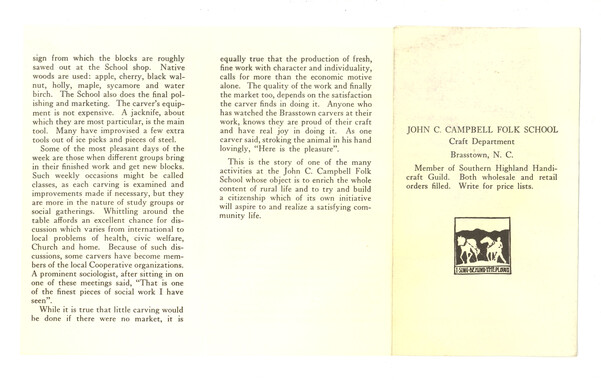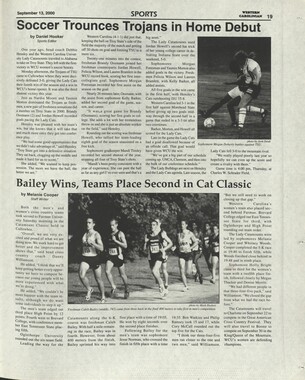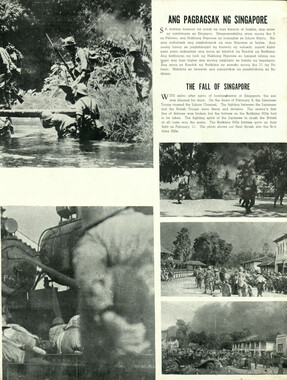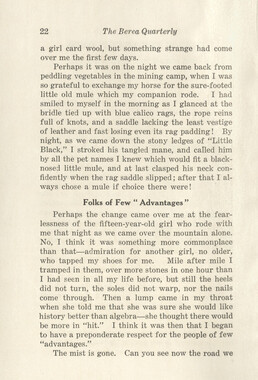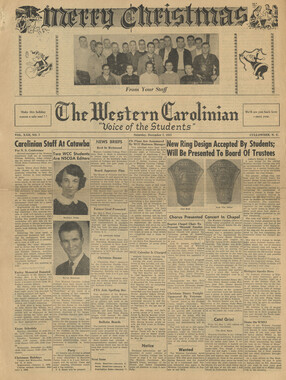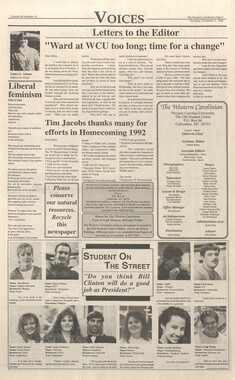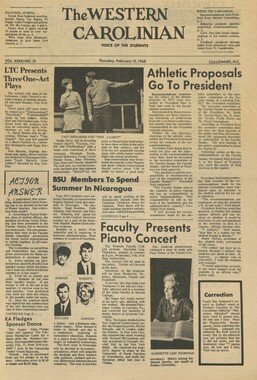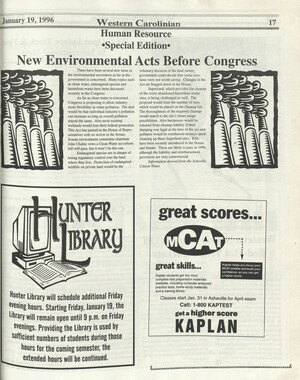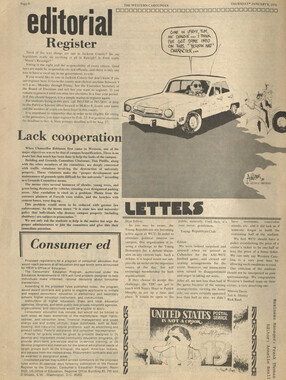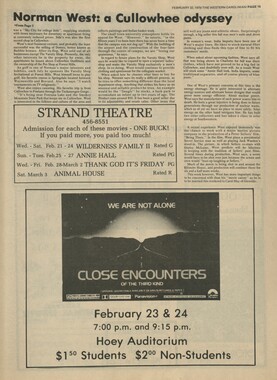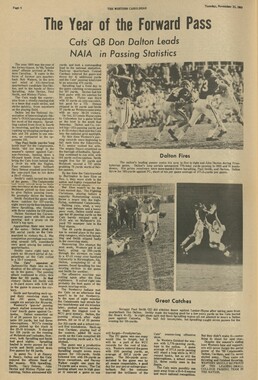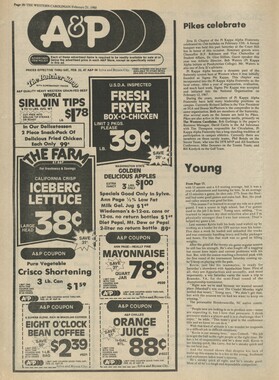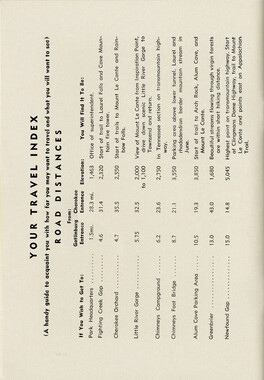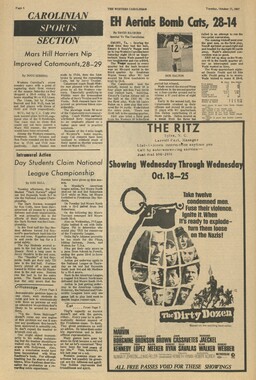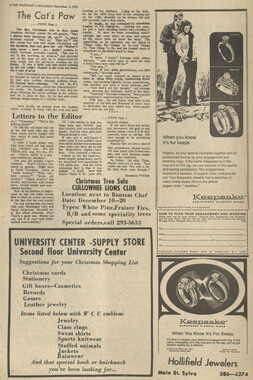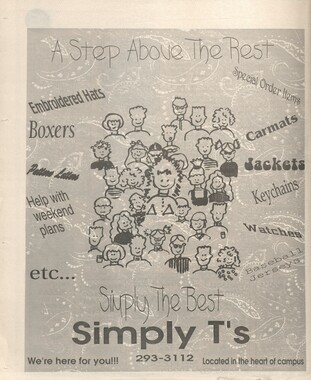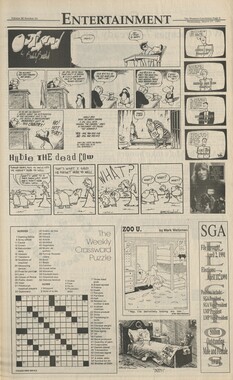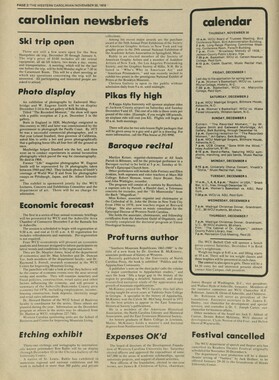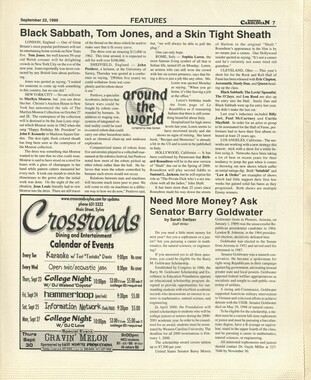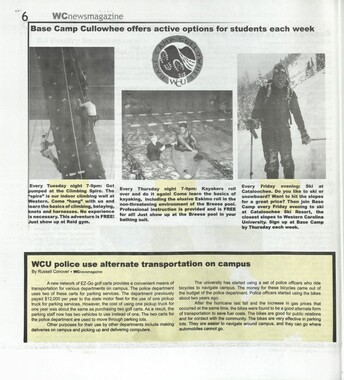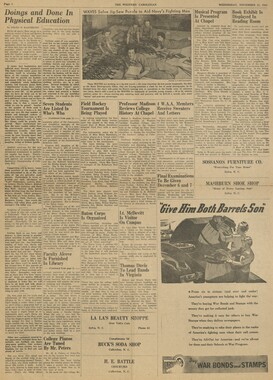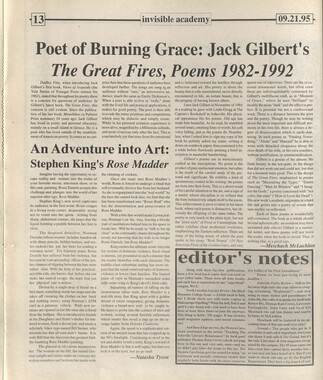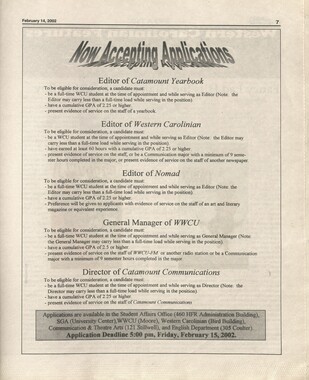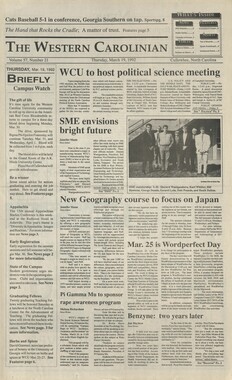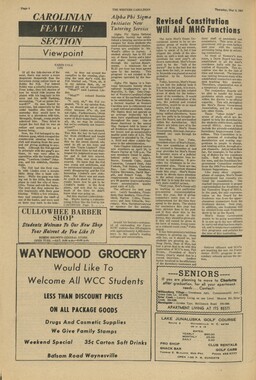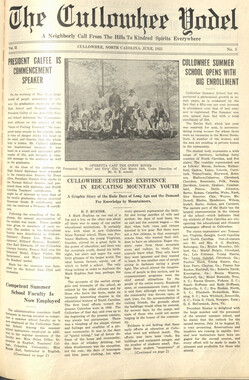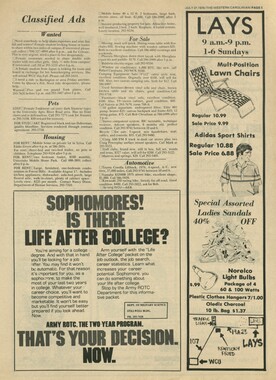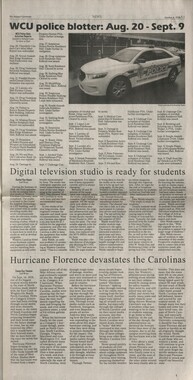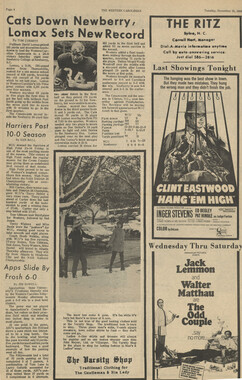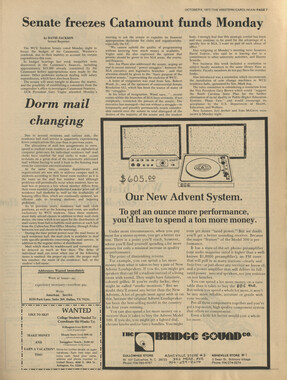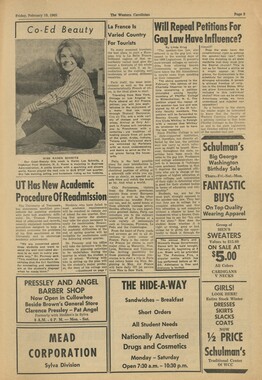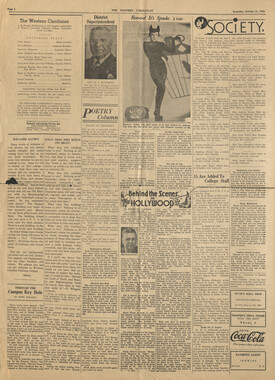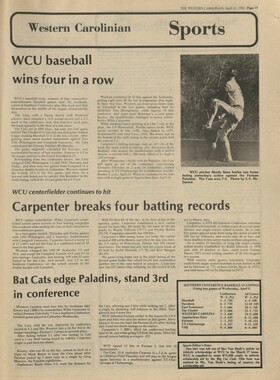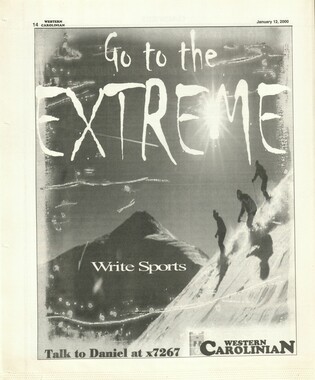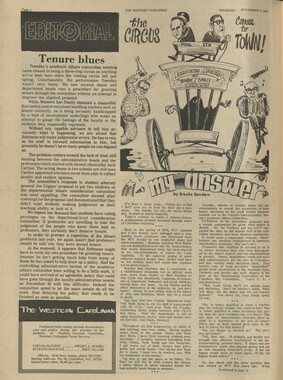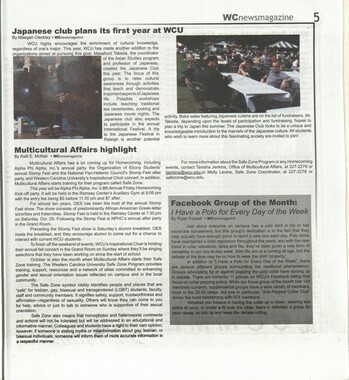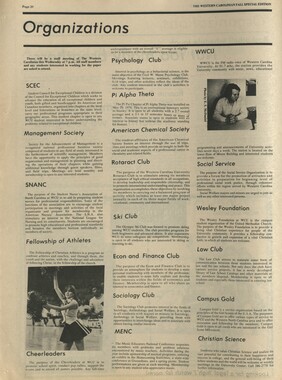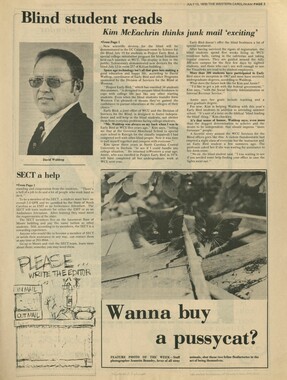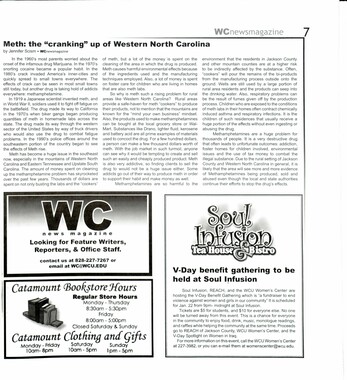Western Carolina University (21)
View all
- Canton Champion Fibre Company (2308)
- Cherokee Traditions (291)
- Civil War in Southern Appalachia (165)
- Craft Revival (1942)
- George Masa Collection (137)
- Great Smoky Mountains - A Park for America (2900)
- Highlights from Western Carolina University (422)
- Horace Kephart (973)
- Journeys Through Jackson (159)
- LGBTQIA+ Archive of Jackson County (85)
- Oral Histories of Western North Carolina (316)
- Picturing Appalachia (6797)
- Stories of Mountain Folk (413)
- Travel Western North Carolina (153)
- Western Carolina University Fine Art Museum Vitreograph Collection (129)
- Western Carolina University Herbarium (92)
- Western Carolina University: Making Memories (738)
- Western Carolina University Publications (2491)
- Western Carolina University Restricted Electronic Theses and Dissertations (146)
- Western North Carolina Regional Maps (71)
- World War II in Southern Appalachia (131)
University of North Carolina Asheville (6)
View all
- Allanstand Cottage Industries (62)
- Appalachian National Park Association (53)
- Bennett, Kelly, 1890-1974 (1463)
- Berry, Walter (76)
- Brasstown Carvers (40)
- Carver, George Washington, 1864?-1943 (26)
- Cathey, Joseph, 1803-1874 (1)
- Champion Fibre Company (233)
- Champion Paper and Fibre Company (297)
- Cherokee Indian Fair Association (16)
- Cherokee Language Program (22)
- Crowe, Amanda (40)
- Edmonston, Thomas Benton, 1842-1907 (7)
- Ensley, A. L. (Abraham Lincoln), 1865-1948 (275)
- Fromer, Irving Rhodes, 1913-1994 (70)
- George Butz (BFS 1907) (46)
- Goodrich, Frances Louisa (120)
- Grant, George Alexander, 1891-1964 (96)
- Heard, Marian Gladys (60)
- Kephart, Calvin, 1883-1969 (15)
- Kephart, Horace, 1862-1931 (313)
- Kephart, Laura, 1862-1954 (67)
- Laney, Gideon Thomas, 1889-1976 (439)
- Masa, George, 1881-1933 (61)
- McElhinney, William Julian, 1896-1953 (44)
- Niggli, Josephina, 1910-1983 (10)
- North Carolina Park Commission (105)
- Osborne, Kezia Stradley (9)
- Owens, Samuel Robert, 1918-1995 (11)
- Penland Weavers and Potters (36)
- Roberts, Vivienne (15)
- Roth, Albert, 1890-1974 (142)
- Schenck, Carl Alwin, 1868-1955 (1)
- Sherrill's Photography Studio (2565)
- Southern Highland Handicraft Guild (127)
- Southern Highlanders, Inc. (71)
- Stalcup, Jesse Bryson (46)
- Stearns, I. K. (213)
- Thompson, James Edward, 1880-1976 (226)
- United States. Indian Arts and Crafts Board (130)
- USFS (683)
- Vance, Zebulon Baird, 1830-1894 (1)
- Weaver, Zebulon, 1872-1948 (58)
- Western Carolina College (230)
- Western Carolina Teachers College (282)
- Western Carolina University (2008)
- Western Carolina University. Mountain Heritage Center (18)
- Whitman, Walt, 1819-1892 (10)
- Wilburn, Hiram Coleman, 1880-1967 (73)
- Williams, Isadora (3)
- Cain, Doreyl Ammons (0)
- Crittenden, Lorraine (0)
- Rhodes, Judy (0)
- Smith, Edward Clark (0)
- Appalachian Region, Southern (2940)
- Asheville (N.C.) (1944)
- Avery County (N.C.) (26)
- Blount County (Tenn.) (195)
- Buncombe County (N.C.) (1680)
- Cherokee County (N.C.) (283)
- Clay County (N.C.) (556)
- Graham County (N.C.) (238)
- Great Smoky Mountains National Park (N.C. and Tenn.) (525)
- Haywood County (N.C.) (3573)
- Henderson County (N.C.) (70)
- Jackson County (N.C.) (4919)
- Knox County (Tenn.) (35)
- Knoxville (Tenn.) (13)
- Lake Santeetlah (N.C.) (10)
- Macon County (N.C.) (421)
- Madison County (N.C.) (216)
- McDowell County (N.C.) (39)
- Mitchell County (N.C.) (135)
- Polk County (N.C.) (35)
- Qualla Boundary (982)
- Rutherford County (N.C.) (78)
- Swain County (N.C.) (2185)
- Transylvania County (N.C.) (270)
- Watauga County (N.C.) (12)
- Waynesville (N.C.) (86)
- Yancey County (N.C.) (72)
- Aerial Photographs (3)
- Aerial Views (60)
- Albums (books) (4)
- Articles (1)
- Artifacts (object Genre) (228)
- Bibliographies (1)
- Biography (general Genre) (2)
- Cards (information Artifacts) (38)
- Clippings (information Artifacts) (192)
- Copybooks (instructional Materials) (3)
- Crafts (art Genres) (622)
- Depictions (visual Works) (21)
- Design Drawings (1)
- Digital Moving Image Formats (2)
- Drawings (visual Works) (185)
- Envelopes (101)
- Exhibitions (events) (1)
- Facsimiles (reproductions) (1)
- Fiction (general Genre) (4)
- Financial Records (12)
- Fliers (printed Matter) (67)
- Glass Plate Negatives (381)
- Guidebooks (2)
- Internegatives (10)
- Interviews (817)
- Land Surveys (102)
- Letters (correspondence) (1045)
- Manuscripts (documents) (618)
- Maps (documents) (177)
- Memorandums (25)
- Minutes (administrative Records) (59)
- Negatives (photographs) (6090)
- Newsletters (1290)
- Newspapers (2)
- Notebooks (8)
- Occupation Currency (1)
- Paintings (visual Works) (1)
- Pen And Ink Drawings (1)
- Periodicals (193)
- Personal Narratives (10)
- Photographs (12976)
- Plans (maps) (1)
- Poetry (6)
- Portraits (4568)
- Postcards (329)
- Programs (documents) (181)
- Publications (documents) (2444)
- Questionnaires (65)
- Relief Prints (26)
- Sayings (literary Genre) (1)
- Scrapbooks (282)
- Sheet Music (2)
- Slides (photographs) (402)
- Songs (musical Compositions) (2)
- Sound Recordings (796)
- Specimens (92)
- Speeches (documents) (18)
- Tintypes (photographs) (8)
- Transcripts (324)
- Text Messages (0)
- A.L. Ensley Collection (275)
- Appalachian Industrial School Records (7)
- Appalachian National Park Association Records (336)
- Axley-Meroney Collection (2)
- Bayard Wootten Photograph Collection (20)
- Bethel Rural Community Organization Collection (7)
- Blumer Collection (5)
- C.W. Slagle Collection (20)
- Canton Area Historical Museum (2110)
- Carlos C. Campbell Collection (462)
- Cataloochee History Project (64)
- Cherokee Studies Collection (4)
- Daisy Dame Photograph Album (5)
- Daniel Boone VI Collection (1)
- Doris Ulmann Photograph Collection (112)
- Elizabeth H. Lasley Collection (1)
- Elizabeth Woolworth Szold Fleharty Collection (4)
- Frank Fry Collection (95)
- George Masa Collection (173)
- Gideon Laney Collection (452)
- Hazel Scarborough Collection (2)
- Hiram C. Wilburn Papers (28)
- Historic Photographs Collection (236)
- Horace Kephart Collection (861)
- Humbard Collection (33)
- Hunter and Weaver Families Collection (1)
- I. D. Blumenthal Collection (4)
- Isadora Williams Collection (4)
- Jesse Bryson Stalcup Collection (47)
- Jim Thompson Collection (224)
- John B. Battle Collection (7)
- John C. Campbell Folk School Records (80)
- John Parris Collection (6)
- Judaculla Rock project (2)
- Kelly Bennett Collection (1482)
- Love Family Papers (11)
- Major Wiley Parris Civil War Letters (3)
- Map Collection (12)
- McFee-Misemer Civil War Letters (34)
- Mountain Heritage Center Collection (4)
- Norburn - Robertson - Thomson Families Collection (44)
- Pauline Hood Collection (7)
- Pre-Guild Collection (2)
- Qualla Arts and Crafts Mutual Collection (12)
- R.A. Romanes Collection (681)
- Rosser H. Taylor Collection (1)
- Samuel Robert Owens Collection (94)
- Sara Madison Collection (144)
- Sherrill Studio Photo Collection (2558)
- Smoky Mountains Hiking Club Collection (616)
- Stories of Mountain Folk - Radio Programs (374)
- The Reporter, Western Carolina University (510)
- Venoy and Elizabeth Reed Collection (16)
- WCU Gender and Sexuality Oral History Project (32)
- WCU Mountain Heritage Center Oral Histories (25)
- WCU Oral History Collection - Mountain People, Mountain Lives (71)
- WCU Students Newspapers Collection (1923)
- Western North Carolina Tomorrow Black Oral History Project (69)
- William Williams Stringfield Collection (2)
- Zebulon Weaver Collection (109)
- African Americans (390)
- Appalachian Trail (35)
- Artisans (521)
- Cherokee art (84)
- Cherokee artists -- North Carolina (10)
- Cherokee language (21)
- Cherokee pottery (101)
- Cherokee women (208)
- Church buildings (190)
- Civilian Conservation Corps (U.S.) (111)
- College student newspapers and periodicals (2012)
- Dams (108)
- Dance (1023)
- Education (222)
- Floods (63)
- Folk music (1015)
- Forced removal, 1813-1903 (2)
- Forest conservation (220)
- Forests and forestry (1197)
- Gender nonconformity (4)
- Great Smoky Mountains National Park (N.C. and Tenn.) (181)
- Hunting (46)
- Landscape photography (25)
- Logging (119)
- Maps (83)
- Mines and mineral resources (9)
- North Carolina -- Maps (18)
- Paper industry (38)
- Postcards (255)
- Pottery (135)
- Railroad trains (72)
- Rural electrification -- North Carolina, Western (3)
- School integration -- Southern States (2)
- Segregation -- North Carolina, Western (5)
- Slavery (5)
- Sports (452)
- Storytelling (243)
- Waterfalls -- Great Smoky Mountains (N.C. and Tenn.) (66)
- Weaving -- Appalachian Region, Southern (280)
- Wood-carving -- Appalachian Region, Southern (328)
- World War, 1939-1945 (173)
Western Carolinian Volume 79 Number 04
Item
Item’s are ‘child’ level descriptions to ‘parent’ objects, (e.g. one page of a whole book).
-
-
Our Take Its OK not to know When we are six, the question was, What do you want to be for Halloween? When we were 10, it was, What do you want to be when you grow up? At 14, it became, What are ' you going to do in college? When you were 17, it morphed into pene what you are doing for the rest of your life by picking a major, a university and possibly a job. You walk onto campus on Move-In Day, and you are expected | to have your major already picked out with related classes signed up for. Its a present you wrapped up and stuck on bow ona year ago, and now you're forced to rip into it. Now, we're in our 20s, and were not sure if what we picked just a few short years ago was the right choice. So, what do we do? -Itis hard ee what to major in at 17; many people go undecided for a year or two, waiting to make the decision after they have rier oly things a bit. Sometimes they spend the first year taking liberal studies courses that range from chemistry to theatre, or take a few of the introductory courses of the fields in which they are interested in just to see what is involved. __ But, when those first hints of doubt begin to creep their way into your braindont panic! It is normal! Instead of pulling your hair out in frustration take a moment and breathe. The two best sources for information about what really goes on in your field are your - professors and the people you know! Who better to give you the inside scoop than the people who teach it? Dont simply ask what is Involved in the major, but ask about the events going on in the field. If you arent comfortable talking to the professors, get on the computer and research a topic that interests you to find the fields of study that are involved. For example, if you love the outdoors and exploring the National Forests, then you might look at parks and recreation management as a field of study. That decision we make at 17 isnt perma- nent. Explore the things that interest you and find something that matches that. It is easy to change your major, and it is even more im- a that you find something that you will If the time comes to change your major, head over to the OneStop located in the Killian Annex building and make an appoint- Ment with your adviser. They are willing to help and have a plethora of information lo- cated on their website: www.wcu.edu/current- students/index.asp Our Staff Lex Menz, Editor-in-Chief iImenz@westerncarolinian.com 109-D Old Student Union Cullowhee, North Carolina 28723 828-227-2694 Dr. Brent Kinser, Faculty Adviser Laura Odom, Managing Editor Maegan Hoth, News Editor Kaitlyn Connelly, Copy Editor Allison Adkins, Staff Writer Brandy Carl, Staff Writer Ryan Michaud, Sports Writer Sandra Nikula, Staff Writer Joshua Turner, Staff Writer Jamie North, Staff Writer/Designer Ceillie Simkiss, Staff Writer/Photographer/ Designer Rachael Hedden, Contributing Writer Christian Henderson, Contributing Writer Tabitha Hill, Contributing Writer Chris Ward, Photographer Jeffery Wilson, Cartoonist Jovahnna Graves, Intern Joe Cobbs, Distributor www.westerncarolinian.com CAMPUS VIEWS Cartoon Lex Menz Editor-in-Chief : How is the action plan going? Do you believe the university as whole is now too small? If the program is cut, how many people will lose their jobs? What is the biggest mistake students make when looking for an internship? Did you know you wanted to bea pastor at a young age? Why is service learning important for students? Why is it more than just giving your time? These are all ques- tions Ive asked during _an interview. Theres no secret to it really, in my opinion. Im going to hate saying this because its a clich and silly, but you have to find the flow of the conversation. ; : In my experience, nine times out of 10 the in- terviewee is excited and enthusiastic about an- swering your questions. He or she is delighted or flattered to be chosen or nominated for an ar- ticle in our little campus newspaper. Were small, but we think of The West- ern Carolinian as impor- tant, and we want the professors, staff, students and campus organiza- tions that are spotlighted to feel honored about being recognized. | : The most excited inter- views come from the ones who have an upcoming event or want to get the word out about news and their organization/de- partment/etc. Basically, Its free advertisement, but if the activity or or- ganization is promoting an activity for students, faculty, staff or commu- nity members, then we want to give them the at- tention. Its a partnership that works for both of us: free pubes for them and fun, fresh articles to publish for us. Off the top = x pclewes NA LS, iy of my head, the articles Ive enjoyed writing the most center around an excited interviewee who cannot wait to read the article. Even articles I dont write are excit- ing to read because the reporter comes back and says, They want a copy! Can we make sure we get one? Some examples include: every Taste Buds column we've done so far; Before They Were Educators: Dr. Da- ryl Hale, who asked me to mail a copy to his fi- anc in Germany; Cross the bridge to Briga- doon; a feature on Dr. Sam Miller and Service Learning: Haywood Co. Meals on Wheels. Its easy to forget that the interviewees are just as nervous as the inter- viewer. While some of my staff members may feel intimidated or appre- hensive about talking to strangers, the person on the other side of the desk is jittery as well. In most cases, theyve never seen the questions or know exactly which angle the reporter will take. They also want to make sure they say not only all the information pertinent to the topic but say it in a coherent, intel- ligent manner. Its all the more nerve-wracking when we tell them that they cant review the article before it is pub- lished (However, due to recent events, this fee has changed to include exceptions for specific columns in the Features section.). However, once the interview gets start- ed, both the reporter and who theyre interview- ing begin to relax and get to know one another on a professional basis. Still, its always nice to come back and interview people you know from previous articles. My favorite people to Quotable With languages, a high dose of pa- tience is required because, as I said, its a lifelong journey. ~ Santiago Garcia-Castanon, director of Modern Foreign Languages oo an . A Toon ae Tel oo Importance of idealistic interviewing interview are two upper level administrators who TPve spoken with many times. Chancellor David Belcher insists to meet with reporters and bring them into his office. He wants to meet with you, talk with you firsthand and get to know the staff we have. Id like every staff writer to get the chance to meet him. The first time I in- .terviewed him was for an article over the 2012 summer, and he chuck- led at me. I walked in wearing black high heels and a professional dress. You dont have to dress up, he teased. What he didnt know was that I was in the process of moving to my current home in Sylva. That dress was the only piece of clothing left in my closet! Everything else was already packed or moved into my new house. It was an embar- rassing but mostly a hilarious moment. Dr. Sam Miller, vice chancellor of student affairs, is also a wonder- ful interviewee. That man can talk and talk and talk, but he presents all his information in an interesting manner. For this past issue, he spoke not only about my original topic but explained other aspects about Western Carolina University as well, which will be turned into a new article for Issue 5. Miller also enjoys telling stories. When intern Jovahnna Graves came to my interview, she pointed out to Miller how much he loves Western Carolina. He doesnt have to say it, point blank or figura- tively. You can imme- diately tell. In fact, we did a Meet... article about him, and all he could talk about was the university. Once the LETTERS POLICY We welcome letters from our readers. We urge brevity, both for the sake of effectiveness and the demands of space; letters should be no longer than 500 words. All letters are subject to the same editing for clarity applied to our staff contributions. We will not publish anonymous letters; letters praising or criticizing professors by name; letters making personal attacks or personally hurtful statements; endorsements of or letters from political candidates; or copies of letters to other publications. Because we want to provide access to a variety of viewpoints, each letter writ- ie interview is over, he'll | tell about you his love for sports, ask you how life is going and makes a 100 | percent effort to get to know you. Onavery rare occa- sion, professors, staff members or community members shy away from beinginanewspaper or ignore you entirely. In some cases, this is completely acceptable. Ifa community mem- ber doesnt want to be quoted, they have every right. With faculty and staff members, its tricki- er. Not only is it impolite, I believe, to ignore these student writers, who work extremely hard to put these articles to- gether in a weeks time, but the student body will also lack important information about topics - or stories that apply to them. Whatever gossip or comments there are about how The Western Carolinian isnt picked up or paid attention to, there is always someone faculty, staff, upper administration, students or Sylva/Dillsboro/ Cullowhee community members who will pick up that newspaper and wonder why certain in- formation that explains the story is missing. And, I wholeheartedly believe that The Western Carolinian is read more and more. We send out faculty-wide emails now to make sure profes- sors know when there are new stories to read and what exactly is in each issue, and were distributing in several more places around all of main, west and the Bilt- more Park campuses as well as five locations in Sylva/Dillsboro. I know its important to us, and we hope its important to all of you as well. er will be limited to one letter every four weeks. All letters should be signed, and writers should enclose their addresses and daytime phone numbers. Addresses and phone numbers will not be published but will be used to verify letters. We reserve the right not to print any letter.
Object
Object’s are ‘parent’ level descriptions to ‘children’ items, (e.g. a book with pages).
-
The Western Carolinian is Western Carolina University's student-run newspaper. The paper was published as the Cullowhee Yodel from 1924 to 1931 before changing its name to The Western Carolinian in 1933.
-
